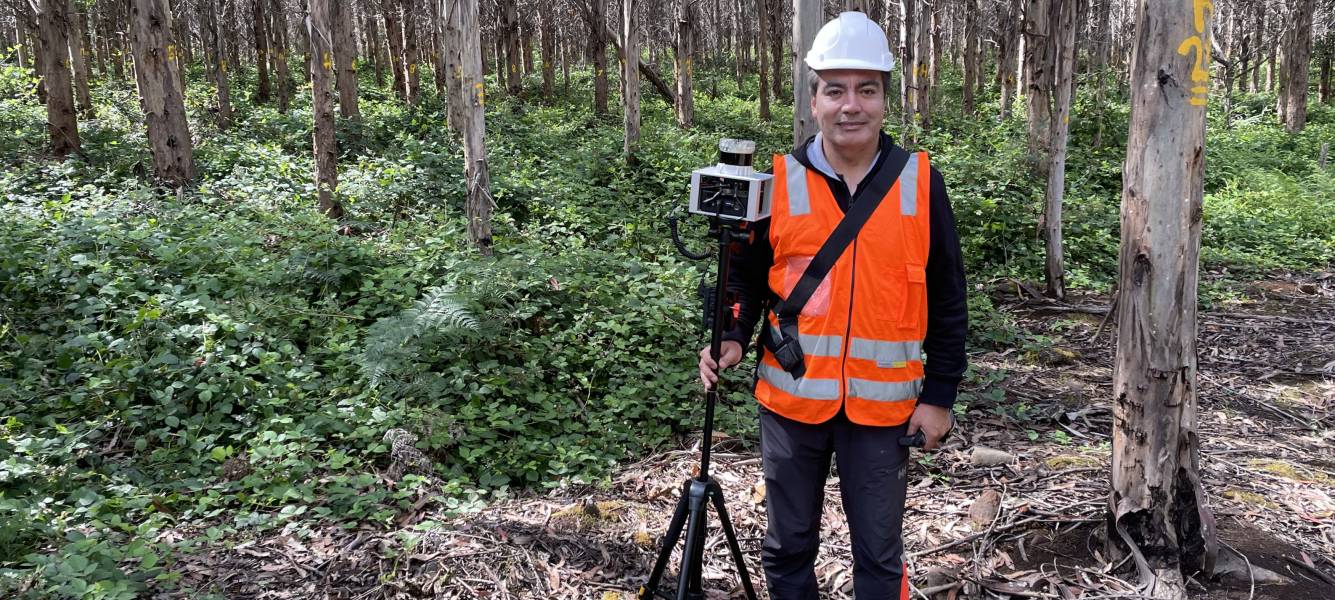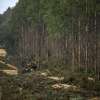
Assessing the efficiency of mechanised operations and tree/stem quality
Posted 09 February 2023
Tasmania, and Australia generally, is currently experiencing a significant wood supply shortage, particularly in the building and construction sector.
In recent years, significant work has been undertaken in Tasmania to identify industry and community supported priorities for addressing the need for additional wood.
PFT has partnered with Forico to investigate costs and silvicultural practice for the efficient transition from short (pulpwood focused) to longer rotation (solidwood/sawlog or engineered wood focused). The overall aim is to foster stand improvement strategies in Tasmania’s existing plantation resource to improve domestic sawlog supply outcomes in the short to medium-term.
Transitioning from pulp to solid wood plantation regimes in Tasmania requires a good understanding of the costs involved during the thinning operations and the factors that explain the productivity and costs of mechanised equipment in these conditions.
The project will use machine productivity data to assess mechanised thinning operations in Eucalyptus nitens stands, pinpointing those factors with the most significant impacts on productivity and costs.
In addition, sensing technology, including mobile LiDAR systems, will be used to assess the remaining trees' quality features (DBH, height, branchiness, tree form, stem damage). This project will provide valuable information for more cost-effective mechanised thinning operations. An extension of this project will be to develop an automated system for tree selection during thinning operations based on Lidar data.
Project activities include:
- Plot layout by Technical Forest Services and measurement of standing trees before thinning
- Scanning of plots before the thinning operation using a LiDAR and camera sensors
- Time and motion study of machine productivity data during the thinning operation conducted by Forico appointed Tasmanian contractor Casegrande Lumber
- Assessment of remaining trees using sensing technology
- Collection of machine data from the onboard computer
In addition to the activities to be performed during the operational trial, the project involves an economic assessment of the impacts of stem damage during mechanised thinning operations (only if considerable damage occurs during the thinning operation) and the publication of two reports (draft and final) and a scientific article.
PFT joined Forico’s Operations Forester Roger Ambrose, Casegrande operator Brad Fuller and AFORA/FIRC, UniSC Senior Research Fellow, Mauricio Acuna on the trial site at South Prospect, Ridgley between 16th and 20th Jan where trial plots were scanned with the sensors pre-thinning, the time and motion study conducted, and then rescanned post thinning. Processing and analysis of results is currently underway. The findings of the project will be presented at the FORMEC conference, Florence, Italy, later in 2023.
Sadly, this is Maurico’s last research project in Australia and an important milestone in his career.
“After 16 years in Tasmania, I have been appointed as Research Professor in Automation and AI in forest operations at Luke, Finland’s Natural Resources Centre. I expect to continue collaborating with the Tasmanian forest industry, particularly with organisations such as Forico and PFT, with which I have forged great relationship over the years.”
PFT wishes Maurico every success with his new appointment and looks forward to fruitful collaboration in the future.
Muchas gracias, Maurico. Hasta Luego.
Share this Article
Latest Articles
-

17 September 2025
Celebrating excellence at the Tasmanian Timber Awards
-

17 September 2025
Forest Practices Authority Research Update Day
-

13 August 2025
Have you seen our Stems for CO2 Project signage on the Midlands Highway?
Archives
- ActivAcre hits milestone, calls for more farmers to get on board
- Napier's leading the way in sustainable forestry and carbon-neutral farming
- Sound science needed to assess carbon impacts of timber harvesting
- Newly appointed TFFPN Board of Directors
- Graduate Certificate of Forestry Scholarship
- Forestry Australia Mentoring Program 2025
- Forest Industry Roundtable planning for the long term
- Eagle Management Constraint Period extended
- Successful private native forest management celebrated
- $15 million investment in new ship loader to boost Bell Bay's forestry exports
- Standing with Tasmania's forestry industry: buy local
- TFPA: Tasmanian Freight Equalisation Scheme needs a ground-up review
- AFCA Gala Dinner celebrates industry excellence
- Fire permits now required Statewide
- Forest leaders hone skills in sustainable native regrowth management
- Tasmanian forests and the carbon market: Barriers and opportunities
- Spring is the time for fuel reduction burning
- Primed for Growth: A situation analysis of the Tasmanian Forest and Wood Products Sector
- Audit requirements cut for low-risk plantation projects
- Guidance and support for landowners after damaging winds
- Forestry Australia welcomes further definition of active forest management
- Farm & Forest Mapper Tool highlighted at Rural Youth Tasmania's Young Farmer of the Year competition
- Senate Select Committee inquiry into the Tasmanian Freight Equalisation Scheme
- Timberlink announces new wood composite products brand
- Newly developed protocol a vital tool for safeguarding forestry industry
- Red Hot Tips: Fire management for Tassie farmers
- Bioenergy: Fuelling industries with trees
- Harvesting trees: What you need to know
- Shelterbelts: How are they contributing to farm systems?
- Infill plantings and remnant vegetation: Why biodiversity depends on a thriving understory
- Plantation planning: The key to a successful plantation
- Exciting interactive forestry knowledge hub launched
- $450,000 farm forestry grant recipients revealed



